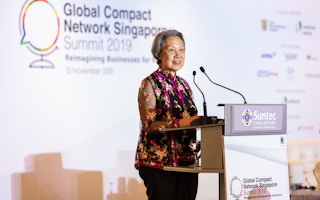Singapore state investor Temasek Holdings will go carbon neutral by next year, and is looking to do the same with its portfolio “sooner than later”, executive director and chief executive Ho Ching said at a corporate sustainability event on Tuesday.
As an investment firm, Temasek does not produce goods and services and its carbon emissions are mostly from the consumption of electricity, water, paper and air miles—which it will report from this financial year, said Ho at the Global Compact Network Singapore Summit at the Suntec convention centre.
Temasek has committed to halving the greenhouse gas emissions of its portfolio by 2030, and Ho said it would also “study how we can shape a carbon neutral portfolio sooner than later”.
Companies in its portfolio, which had a net value of S$313 billion as at March 31, include telecommunications provider Singtel, DBS Bank, Singapore Airlines, utility SP Group, agribusiness giant Olam International and transport provider SMRT Corporation.
DBS was recently in the news for potentially funding the future Vung Ang 2 coal-fired power plant in Vietnam, despite its pledge to stop financing new coal projects after seeing through existing ones. Coal is the single biggest source of global warming.
Asked how Temasek would achieve carbon neutrality and how much it would cost, a spokesperson told Eco-Business it is developing ways of reporting consumption and neutralising its carbon footprint over time. “We will likely have more to say on this in our future annual reports,” he added.
Temasek decided to go carbon neutral after a “pretty hard” and “quite emotional” debate among its senior leadership, said Ho, who added that she was not present at the meeting but was pleased with the decision.
“Dilhan Pillay, CEO of Temasek International, our investment arm, said, ‘Sustainability is not just one of our roles, it is at the core of everything we do’,” she told the audience, which comprised mainly corporate representatives.
Elaborating during a question-and-answer segment following her speech, Ho said one of the issues debated was whether the decision would mean cutting off all investments that are “emissions-unfriendly”.
Noting that the refining and petrochemicals sector generates nearly half of Singapore’s total greenhouse gas emissions, Ho said she takes a different view from those who feel Singapore should stop hosting petrochemical plants. She said she prefers working with companies on their sustainability journey instead of generating a divide between polluting and non-polluting parties.
“For us in Temasek, we look at investments not as a way to throw our weight around or to scold people but, really, we spend a lot of time working with our portfolio companies on strategic needs,” she said. “We see our job as bringing ideas, highlighting risks, bringing data and then moving the journey forward, rather than (taking) a stick and (saying), ‘I’ve got the money and let me scold you publicly’.”
Temasek has also tried to take a different approach from other impact funds through its ABC World Asia private equity fund, said Ho. “ABC” stands for active economy, beautiful inclusive societies and a clean, cool earth.
ABC World Asia, established in May by its philanthropic arm Temasek Trust, closed its inaugural fund at S$385 million in October. It covers Asia, the United States and Europe, said Ho.
The fund first quantifies and scores the potential social and environmental impact of companies using evidence-based research. Then it will proceed to look at the financial returns of companies only if they meet certain scores, said Ho. This is in contrast to most funds, which would first look at financial returns before looking at ESG indicators, she added.
She urged smaller businesses that do not have vast resources to devote to sustainability to start with “small things” like tracking their electricity, water and transportation usage. These are a proxy for indirect emissions, she said.
“What matters to us is cost—where are the costs, can we find them? Don’t just think of cost of people and cutting labour, think of the cost of resources that you’re using and cutting that, because behind that cost (are) the emissions,” she said.
Expressing hope that the world can come together for the good of the environment, Ho pointed to news that the ozone layer, which protects the earth from ultraviolet rays that can cause skin cancer, is repairing itself.
This is the result of a 1987 international agreement called the Montreal Protocol that saw countries phasing out chlorofluorocarbons, she said. “Today we’re seeing the hole repairing itself over Antarctica. So I’m very, very hopeful that people as a whole want to do good.”
Temasek is not alone in taking guidance from the United Nations’ Sustainable Development Goals for its investments.
Norway’s sovereign wealth fund, worth US$1 trillion, is also an active investor and wants the boards of companies it invests in to develop strategies to address the goals.
Norges Bank Investment Management, which manages the fund, said last year that it expects companies to address ocean sustainability and pollution. In June this year, it received the green light from Norway’s parliament to drop investments in eight coal companies and an estimated 150 oil producers, reported the Guardian.










